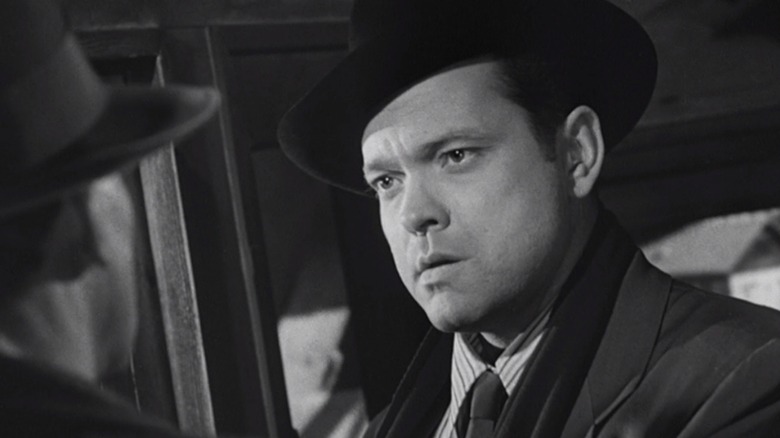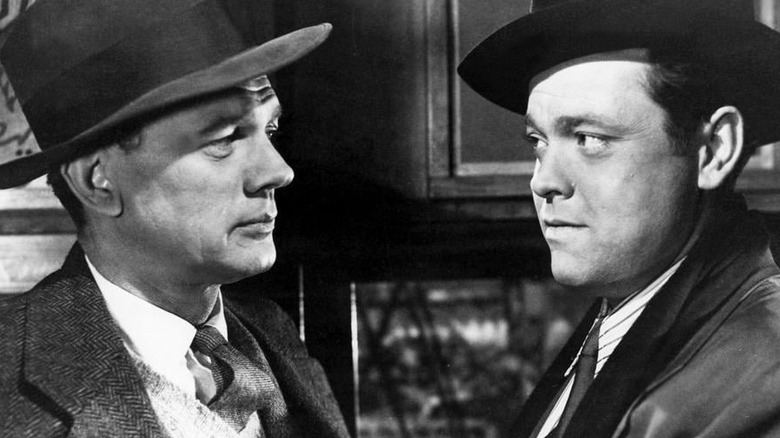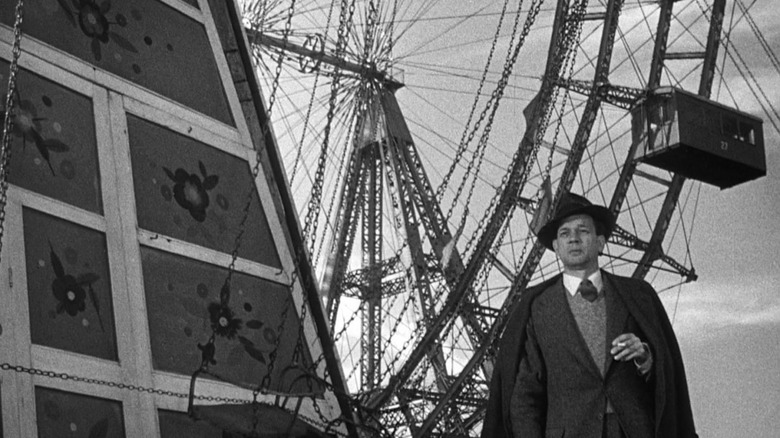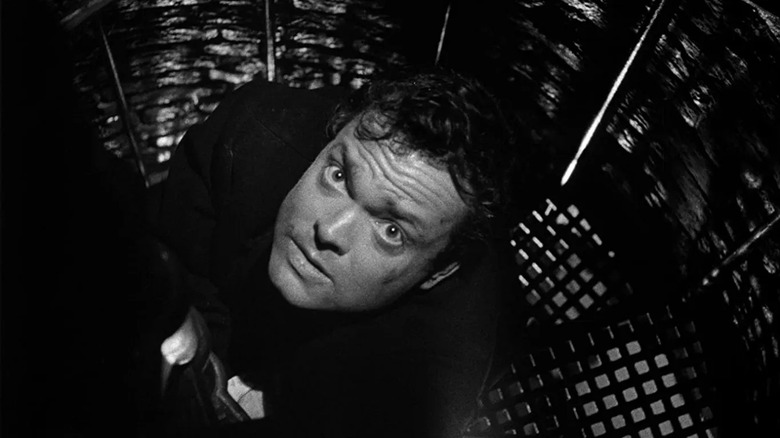The 'Best Line' In The Third Man Came Straight From The Mind Of Orson Welles
When cameras rolled on the Viennese location shoot of "The Third Man" in October 1948, director Carol Reed's villain wasn't even in the city. Orson Welles had signed on to play shady racketeer Harry Lime, but in a bid to raise his fee (via BBC Four), he wouldn't agree to arrive until absolutely necessary. With Welles' reputation as an unreliable troublemaker, Reed might have been forgiven for privately wondering if he was going to show up at all. In the meantime, he shot around him, using a body double and hiding the character in the film's celebrated shadows (via Financial Times). Would Reed's decision to fight powerful producer David O. Selznick on casting the maverick come back to haunt him?
Thankfully, Welles kept to his word and arrived by train in Vienna on the date agreed — Reed said in an interview with journalist and author Charles Thomas Samuels for his 1972 book "Encountering Directors" (via Wellesnet) — strolling onto the set and getting his first scene in the can by nine o'clock in the morning. So far, so good. But the notorious prima donna in Welles emerged when it came to shooting a chase scene later that day in the city's sewers. Taking issue with the cold and unsanitary conditions, the actor took some persuading to go ahead, before improvising as he wished. "With Orson you know, everything has to be a drama," Reed added.
Ultimately though, the director's gamble on Welles paid off. The mercurial star fully embodied the charming yet deeply amoral Harry Lime. Perhaps more than any of his screen roles, the racketeer seems so closely aligned to Orson Welles the person, or, at least, Orson Welles the myth. His eventual reveal, appearing in a doorway with a devilish smirk, is one of the greatest entrances in cinema history. To top things off, Welles also chipped in with the best line in the whole movie.
So what happens in The Third Man again?
Down-on-his-luck pulp novelist Holly Martins (Joseph Cotten) travels to Vienna on the promise of a job from his old friend Harry Lime (Orson Welles). His arrival in the divided city is badly timed — Lime is knocked down in the street outside his apartment and killed 10 minutes before Martins gets there. At Lime's funeral, Martins meets Major Calloway (Trevor Howard), a British military policeman who has been investigating his late friend's black market activities, and Baron Kurtz (Ernst Deutsch), a sinister acquaintance of Lime's who claims he helped move his body with another man after the fatal accident.
Martins can't bring himself to believe Calloway's accusations and decides to carry out his own investigation into Lime's death. That leads him to the latter's devoted lover Anna (Alida Valli), and conflicting testimony that places a mysterious third man at the scene of the accident.
Annoyed by Martins poking his nose in, Calloway reveals that Lime was selling diluted stolen penicillin on the black market, causing the death of many sick children. Dispirited and lovelorn after Anna rejects his awkward advances, Martins resigns himself to heading home to the U.S. But then he spots a figure lurking in a darkened doorway near Anna's apartment building — it is Harry Lime. How could that be?
After Lime vanishes, Martins reports the sighting to Calloway, who orders the exhumation of Lime's body. The coffin contains the remains of an orderly who helped Lime steal penicillin from a military hospital. Deciding it is time to confront his old friend, Martins agrees to see him at Vienna's Prater amusement park in broad daylight, where they take a nice little ride on the city's famous Riesenrad Ferris wheel together.
The Cuckoo Clock speech
As Holly Martins (Joseph Cotten) confronts Harry Lime (Orson Welles) two hundred feet above the ground in what is the film's dramatic and moral highpoint, it culminates in the brilliant "Cuckoo Clock" speech — the most famous of lines from "The Third Man." But the words didn't come from the pen of celebrated novelist and "The Third Man" writer Graham Greene, who had supplied the film with great dialogue. They sprang from the mind of Welles himself.
With the Ferris wheel carriage soaring above the park, Martins takes Lime to task on his cynical black-market penicillin scheme, asking him if he's ever seen his victims. Lime rebuffs him for being so melodramatic, questioning if he would really feel any pity if one of those dots far below stopped moving forever. Sliding the carriage door open, Lime muses that it wouldn't be difficult to do away with his pesky friend. You can tell it's not an empty threat. As they get back to ground level, Lime departs with a few final thoughts:
"You know what the fellow said — in Italy, for 30 years under the Borgias, they had warfare, terror, murder, and bloodshed, but they produced Michelangelo, Leonardo da Vinci, and the Renaissance. In Switzerland, they had brotherly love, they had 500 years of democracy and peace — and what did that produce? The cuckoo clock!"
While the delivery sounds off the cuff, according to Brigitte Timmermann's 2005 book "The Third Man's Vienna" (via The Guardian), it actually took 32 takes to nail the speech. (The scene was filmed not on the Ferris wheel, but rather in Shepperton Studios in England.) Greene acknowledged Welles as the author of the monologue (via Financial Times), but "The Third Man" assistant director Guy Hamilton believes it wasn't original: "I am convinced [Welles] heard it somewhere."
Historical accuracy and the shadow of Harry Lime
As delicious as the "Cuckoo Clock" speech is, it isn't culturally or historically accurate. In "This is Orson Welles," a collection of conversations between Welles and critic-director Peter Bogdanovich, the former said:
"When ['The Third Man'] came out, the Swiss very nicely pointed out to me that they've never made any cuckoo clocks –- they all come from the Schwarzwald, in Bavaria!"
Writer John McPhee, in his 1984 book "La Place de la Concorde Suisse," also pointed out that Switzerland had one of the most feared military forces in Europe during the time of the Borgias (via Google Books). No one really cares about accuracy, however, and the speech is as synonymous with "The Third Man" as the jaunty zither score from Anton Karras.
Despite appearing on screen for less than ten minutes, Harry Lime dominates the entire film and Welles received international adulation for what amounted to an extended cameo. As the "Citizen Kane" actor-director noted in his chat with Bogdanovich, every conversation in "The Third Man" prior to Lime's appearance is about the shadowy racketeer. The character proved so popular that Welles reprised his role a few years later for a British radio show called "The Lives of Harry Lime," a series of prequel adventures set prior to the events of the film.
Over 70 years later, Harry Lime and "The Third Man" still cast a long shadow over any film noir buff's visit to Vienna. Riding the iconic Riesenrad Ferris wheel — which still turns slowly above the city skyline to this day — who can resist putting their own spin on the "Cuckoo Clock" speech?



